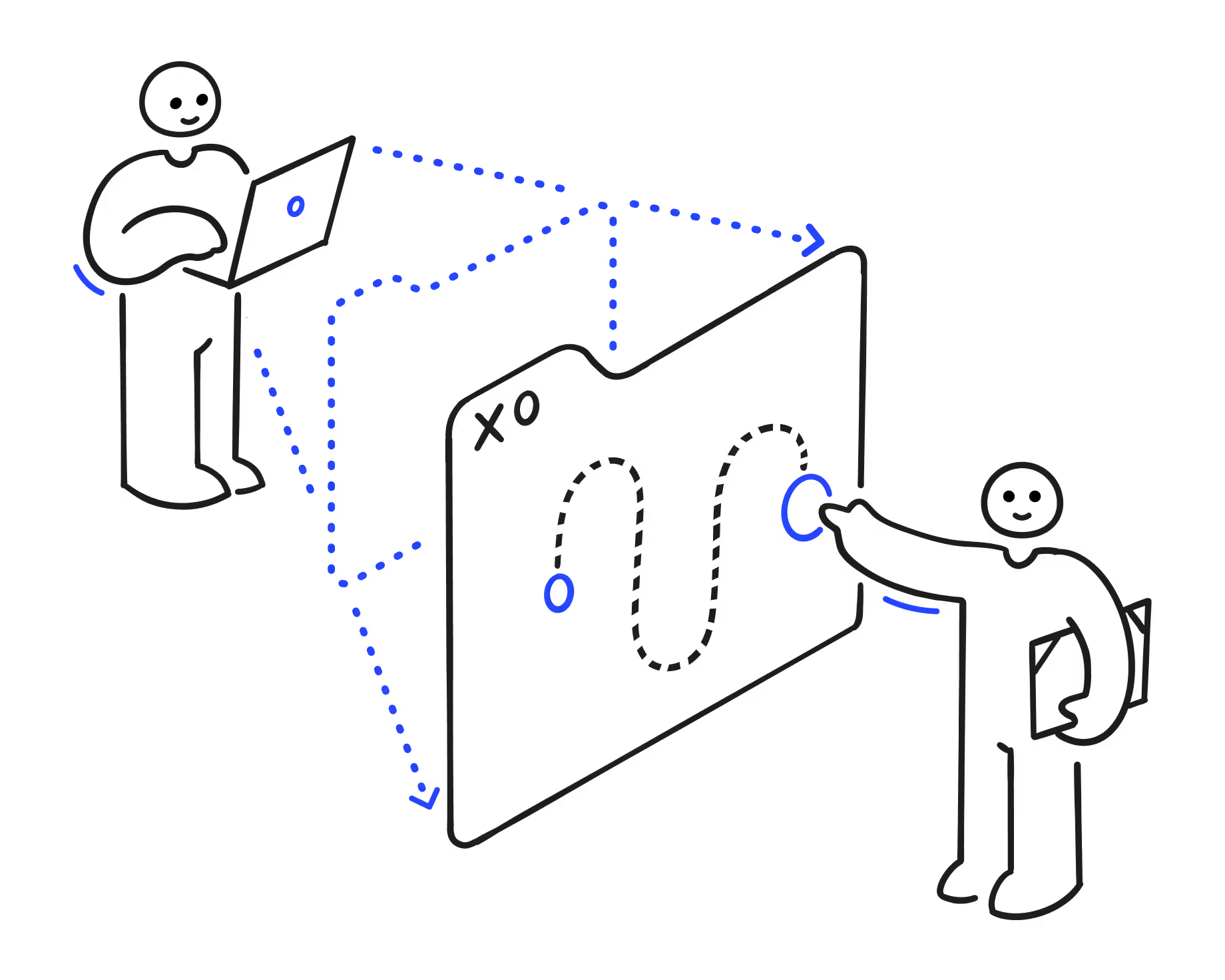7 mistakes managers make when giving annual performance reviews

Discover Workleap Officevibe's benchmark report on 12 key employee engagement metrics

It’s that time of year again: annual performance reviews.
This can be a stressful time for both people managers and employees. For people managers, it’s a ton of preparation work. And for employees, it’s quite nerve-racking to discuss their performance.
While it’s not always easy, feedback and career conversations are crucial for growth. But should they only take place once a year? By the end of this article, you should have a better idea of what type of review cycle is best for your company — and clear ways to get you there.
Top 7 annual performance review mistakes
If you’re only doing performance reviews once a year, there’s a lot of pressure to get it right. Today, most HR experts would suggest regular, constructive feedback sessions. Big companies like GE, Adobe, Accenture, and Netflix have caught onto the problems with annual performance reviews and dropped them altogether.
But we’ll let you decide what works best for your company. Whether you want guidance to improve your current process or build a case for revamping it altogether, here are seven performance review mistakes you need to know about.
[ov_cta id="5116621"]
1. Putting in zero effort
The most common mistake employers make in performance reviews is insufficient preparation.
Oftentimes, performance review prep comes secondary to other, “more important” work — a quick, side-of-desk task to touch between meetings.
Sometimes, people managers just don’t realize the importance of performance reviews and insufficient preparation is a symptom of inadequate training for reviewers. Or, they understand the importance, but think they can get by with little effort.
But here’s the thing: people managers set the precedent for improvement. If they don’t put in the effort to review their team, their team won’t put the effort in to improve.
This is why we recommend frequent performance check-ins with your team members: it’s much easier! It requires way less prep because you don’t have to dig through documents to remember their work from 11 months ago. You don’t have to worry about a lack of specificity or irrelevant feedback. Instead, you can have a short session on their most recent work — and set short, actionable goals for the upcoming months.
2. Falling for the Recency Effect
As we touched on above, another annual performance review mistake is basing your assessment only on recent work. It’s very common because we’re human — and recent events are the most memorable. This is called the Recency Effect.
Try this quick experiment to see what we mean:
- Have someone recite a list of 10-15 words to you. Which words do you remember?
- Notice that the last group of words received stands out to you the most.
- Notice that the first group of words recited stands out to you more than the words in the middle (this is called the Primacy Effect)
While it’s natural to fall for the Recency Effect, it’s not exactly fair to your employees. So, as a people manager, you should take note of your team’s accomplishments throughout the year to prepare for your annual reviews. Or, have frequent feedback sessions — perhaps once a month or quarter.
Imagine only watching the beginning and the end of a movie. You might get a general idea about what’s going on, but you would have missed the entire plot. So, how can you rate it properly?
Many say this is why performance reviews don’t work. A lot can happen in 12 months, which makes it very easy to overlook great performance
3. Focusing solely on negatives
As the saying goes: People have a habit of becoming what you encourage them to be, not what you nag them to be.
The purpose of performance reviews is to motivate your employees just as much as it is to offer constructive criticism. Ignoring achievements and contributions is a quick way to de-motivate your people. But then again, don't just give a compliment for the sake of giving one.
A tip for offering meaningful positive feedback? Avoid empty compliments. Here’s what not to say in a performance review:
- “Overall, you are doing great.”
- “I like the work you did on that project.”
- “You are an asset to the team.”
- “We appreciate all that you do.”
Instead, qualify your statements. Use specific employee feedback examples:
- “I really like the way you handled ‘X issue’ on your last project. It showed great leadership skills.”
- “Your idea to add ‘X’ to the project really helped it take off. You have great creative input.”
- “I noticed you’ve been staying extra hours during our production period and I want you to know it’s really appreciated. Your dedication means a lot to us.”
Because our brains are trained to latch on to negative feedback, make sure that the positive feedback you are offering has ample weight. This clarity will also help reinforce desired behaviors. There are also ways to do deliver negative feedback without de-motivating your employees.
Another way to boost motivation? Using this review to look ahead, not just reflect.
UCLA professor of management, Sam Culbert, believes that annual performance reviews can be very damaging, which is why he developed the concept of Performance Preview, a more positive approach to reviews:
Think of it like driving. There are moments when you need to look in the rearview mirror. But more importantly, you should look ahead at what's in front of you.
4. Involving the wrong people
Another common performance review mistake is involving the wrong people.
Yes, a senior leader may see employees’ work from afar, but they don’t see their day-to-day performance. And they’re likely not documenting performance throughout the year.
In order to provide a fair review, all work deserves to be noticed.
You wouldn’t ask a movie critic to review a film if they’ve only watched a trailer, so how can a senior supervisor or leader review an employee with whom they have so little daily contact?
The employee will also feel they were assessed fairly if the review is conducted by a leader who works closely with them. And that’s incredibly important for keeping them engaged and motivated to perform their best.
5. Surprising your employees
Performance reviews shouldn’t be a surprise to your team. It’s important to let them know when it’ll happen and what you’ll cover.
Here's why:
- It allows them to mentally prepare for an important conversation
- It gives them time to prepare notes and proof points regarding their work
- It shows that you’re taking time to prepare and value their contributions and growth
The meeting invite is also a great opportunity to set the tone and invite collaboration. Here’s an example:
{highlight}
I look forward to meeting with you one-on-one to talk about your year. I’ll have some notes prepared but mostly I'd like to hear what you have to say!
{highlight}
Not including employee input could start you off on the wrong foot. Making this a collaborative, inclusive process right from the meeting invite sets a positive tone for the upcoming conversation.
6. Tying salary bumps to the review
Basing pay bumps on performance reviews is a common mistake employers make in performance reviews. However, it can wind up hurting the culture of your company. It's explained well in this article:
“Performance reviews that are tied to compensation create a blame-oriented culture. It’s well known that they reinforce hierarchy, undermine collegiality, work against cooperative problem solving, discourage straight talk, and too easily become politicized. They’re self-defeating and demoralizing for all concerned.”
Tying the review to compensation pushes the real meaning of the review to the backburner and makes it prominently about money.
Ultimately, a review is meant to discuss the performance of the employee, not their salary. But with this approach, it’s likely that the employee will be focused on whether or not they’ll get a raise — not how they can bring more value to the company.
7. Skipping a review altogether
Another problem with annual performance reviews? Sometimes, they don’t happen. And failure to discuss career goals is the biggest mistake of all. But sadly, it happens quite often.
If your performance reviews happen annually, there’s a lot of pressure on people managers to get it done and get it done right. Shifting to frequent one-on-ones makes the whole process less overwhelming — for both parties.
In this article, Russ Laraway, HR leader and author, shares that:
The idea is to keep the communication flowing regularly. Not once a year. And especially not never.
Why performance reviews don’t work
Work can get busy — and sometimes it may feel like you’re always one step behind — but feedback needs to happen regularly. It’s the bloodline of the workplace.
What takes place in these sessions is connection and communication. Two values that all organizations unquestionably need to succeed.
You may think:
- “There’s nothing important to go over with them right now. They’re doing fine.”
- “It’s too busy. We need to focus on getting work done.”
- “My employees know I have an open-door policy, if they want to talk they can come to me."
But part of being a good manager is encouraging these conversations regularly, even if there isn’t anything “big” to discuss.
Whether it’s to go over some challenges, give praise for great work, or just catch up on how it’s been going — take time to make your employee feel seen, heard, supported, and valued.
Key takeaways
- Come prepared to your employees’ performance reviews
- Give well-balanced reviews, not just assessments of recent work
- Offer recognition and praise in addition to constructive feedback
- Don't forget to look ahead and focus on new objectives for the year to come
- Tell your employees when reviews are happening and how to prepare
- Choose the right leader to conduct the performance reviews
- Avoid tying raises and promotions with performance reviews
- Prioritize performance reviews — don’t skip them!
- Annual reviews should be supplemented by regular feedback sessions
While it's important to avoid these common mistakes employers make in performance reviews, we recommend the more modern approach: regular 1:1 feedback and career conversations with your team members. Building these habits will make you and your team more comfortable — and excited — to explore next steps in their development and contributions to the company.
Now, we gotta ask: What are your thoughts on annual performance reviews?
Give HR and managers the clarity, confidence, and connection to lead better every day.


.avif)


.avif)






